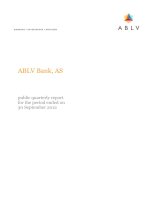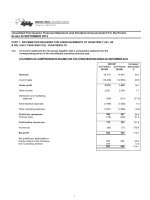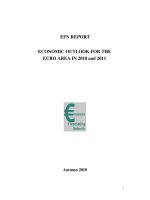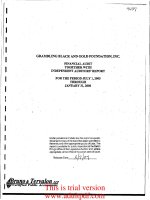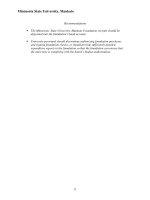Business Platform for Multilingualism - Report for the period September 2009-June 2011 docx
Bạn đang xem bản rút gọn của tài liệu. Xem và tải ngay bản đầy đủ của tài liệu tại đây (57.36 KB, 16 trang )
Business Platform for Multilingualism
Report for the period September 2009-June 2011
2
TABLE OF CONTENTS
Section 1 3
Origins of and background to the initiative 3
Purpose - aims – objectives – scope 4
Composition of the Platform 4
Range of responsibility - governance - timetable 5
Section 2 7
The Business Platform for Multilingualism – a courageous initiative 7
The Business Platform and related Commission initiatives 8
Consultation with other Commission and external initiatives 9
The Platform’s Mission Statement 9
The CELAN project 10
Business Platform membership next 10
Section 3 12
Possible future orientation of business-oriented multilingual policy 12
Language and multilingualism in European policy 12
Business Platform initiatives in this policy context 13
Continuing language initiatives for business 15
3
Section 1
Origins of and background to the initiative
The Business Platform for Multilingualism (BPfM) was set up by the European Commission,
Directorate-General for Education and Culture (DG EAC) in summer 2009.
For the past ten years, the European Union, notably the European Commission, has stressed the
importance of multilingual competence to increased opportunities on the labour market and the
contribution of language skills to the competitiveness of the EU economy. A clear signal to this
effect was sent by the 2002 Barcelona Council, which under the heading “A competitive economy
based on knowledge” called for the “teaching of at least two foreign languages from a very early
age”. The message was taken up in the Commission’s 2005 Communication “A New Framework
Strategy for Multilingualism” (COM (2005) 596 final), in the wake of which the Commission had a
a study prepared on the impact on the European economy of shortages of language skills – the
ELAN study, published in 2006.
Subsequently, the European Commission set up a Business Forum for Multilingualism. In its final
report entitled “Languages mean business – Companies work better with languages” (2008), the
Forum made a number of clear and pertinent recommendations targeted at actors at different levels.
The recommendations included the following – “the European institutions should create a
permanent platform for exchange of best practices for companies, gathering relevant information
from the business community, trade organisations, Chambers of commerce, trade promotion
organisations, schools, and education authorities”. In other words, the Forum came out in favour of
the creation of a stakeholder platform at European level, apparently expecting that through this kind
of platform all pertinent networks would be mobilised and decision-makers in companies and
governments alerted. The Forum’s recommendation was taken up by the Commission in its 2008
Communication “Multilingualism: an asset for Europe and a shared commitment” (COM (2008)
566 final). Clearly, the Commission regarded the platform envisaged as a means for policy
implementation.
In summer 2009, the Commission / DG EAC released a Call for expressions of interest in
participation in a Business Platform for Multilingualism. The Call was targeted at “sectoral branch
4
organisations for companies and other commercial entities, Chambers of Commerce, trade
promotion organisations, members of Enterprise Europe Network and similar associations,
organisations representing the social partners, various non-governmental organisations and interest
groups, and organisations representing institutions for higher education, vocational training or
research”. The profile of potential full Platform members was described as follows: “Organisations
with a transnational or Europe-wide dimension, regrouping entities in several countries and with an
active interest in the promotion of multilingualism for competitiveness and employability.” The
Commission listed a total of eleven criteria one or several of which potential full members were
expected to fulfil.
Purpose - aims – objectives – scope
The general purpose of the BPfM was stated as follows:
• to complement the Open Method of Coordination with the Member States (OMC);
• to maintain a structured dialogue with the European Commission;
• to contribute to the mainstreaming of multilingualism in relevant EU programmes and
policies.
The purpose of this structured dialogue is:
• to complement existing consultation processes;
• to encourage the various actors interested in language policy to work in a more trans-
sectoral way and to better structure and organise themselves at EU level;
• to help interested stakeholders to formulate recommendations with a view to
contributing to the development of a multilingualism policy in Europe;
• to provide opportunities for these recommendations to be presented to the European
Commission and the Member States.
Composition of the Platform
The European Commission invited 21 organisations to become full members of the BPfM; the
organisations selected belong to four broad categories
European intermediary organisations etc.
• BusinessEurope
5
• Comité de Liaision des Géomètres Européen
• COTANCE – “Working for the Leather Industry in Europe”
• Eurochambres
• EuroCommerce
• European Association of Directory and Database Publishers (EADP)
• European Centre of Employers and Enterprises providing Public services (CEEP)
• European Multimedia Forum (EMF)
• European Trade Union Confederation (ETUC)
• Junior Achievement – Young Enterprise Europe (JA-YE Europe)
• European Association of Craft, Small and Medium-Sized Enterprises (UEAPME)
• Foundation for Women Entrepreneurs
EU body
• European Economic and Social Committee
Higher Education associations
• European Association of Institutions in Higher Education (EURASHE)
• European University College Association (EUCA)
Specialist organisations and networks
• CEN/ISSS – Cultural Diversity Focus Group (CDFG)
• Conseil européen pour les langues / European Language Council CEL/ELC)
• EUNIC Brussels
• European ELP-Desk Network
• Infoterm – International Information Centre for Terminology
• Observatoire européen du plurilinguisme
Range of responsibility - governance - timetable
The BPfM was given responsibility for defining its own work programme and working mode, and
for deciding on its internal structure.
The Commission pledged logistic support for a maximum of two plenary meetings per year.
6
The launch meeting was held on 22 September 2009 at the Berlaymont in Brussels in the presence
of Commissioner Orban and Director-General Quintin.
In the course of the launch meeting, the members of the Platform appointed a Steering Group to be
chaired by Prof. Wolfgang Mackiewicz.
Over the last 21 months, the Steering Group has met regularly to discuss and develop the ongoing
initiatives of the Platform.
To date, there have been five plenary meetings of the full Business Platform.
7
Section 2
The Business Platform for Multilingualism – a courageous initiative
The BPfM constitutes the first attempt, at European level, to encourage and enable stakeholders
from various sectors to reflect on, develop recommendations for, and take concrete action with
regard to improving business performance and employability through language strategies.
Of course, neither the European Commission nor the stakeholder organisations selected had any
doubts about the challenge inherent in this scenario. In spite of Bologna and various EU initiatives,
the worlds of education / training and enterprise are still miles apart from each other. At the launch
meeting, it became immediately clear that the organisations selected had their own interests and
agendas, and that it was not going to be easy to find a common way forward. And yet, Platform
members were wise enough to take two decisions that turned out to be the foundation of a success
story: (i) They selected a Steering Group comprised of two representatives of business
organisations, a representative of an EU project designed to promote the European Language
Passport / European Language Portfolio among the business community, and the president of a
European language organisation that had launched projects and developed policies directly relevant
to the issue of languages in the business context. (ii) They created three working groups chaired by
three members of the Steering Group –
• a Research Group, charged with identifying SMEs’ needs, barriers to multilingualism in the
labour market, and good practices that could serve as incentives to companies; in addition,
the group was charged with identifying and making available state-of-the-art documents,
studies and tools;
• a Technical Group, charged with identifying language technological tools, methodologies,
standards and certification, as well as skills and qualifications relevant to enterprise;
• a Group on Marketing and communication, one of whose tasks would be to bring additional
stakeholders together.
It has to be admitted that in spite of repeated attempts made by the chair of the BPfM to involve all
members selected by the European Commission in Platform activities, this turned out to be
8
impossible. However, Platform members by and large validated the proposals submitted to them by
the Steering Group. In other words, the BPfM developed into a two-tier system: a Steering Group
that drew up an action plan, and Platform members that critically discussed, and validated the
proposals developed and submitted by the Steering Group. This is an achievement that should not
be underestimated.
Another achievement is the increased awareness among Platform members of two key issues.
• Members reached agreement on the view that no size fits all. This means, of course, that
there is a limit when it comes to the exchange of best practices for companies. For one thing,
it is probably more appropriate to speak of examples of successful practice; for another,
examples of successful practice have to be seen within their specific contexts.
• Important though language learning and language proficiency are, they are not the one and
all. Language technologies are becoming increasingly important for companies. More
generally speaking, what many members have come to realise is that companies would be
well advised to develop their own specific language strategies.
The Business Platform and related Commission initiatives
Members of the Business Platform were, of course, aware of the fact that they were part of a wider
scenario of Commission activities, including the Open Method of Coordination (OMC) thematic
working group “Languages for Jobs”, and the information initiative "Languages mean business"
specifically targeting small and medium-sized companies. This encouraged the Steering Group and
the Platform as a whole to carefully reflect on its own specific role. The Business Platform decided
that its mission was not to collect and analyse examples of best practise from a broad range of
employment contexts and to promote these to the business community. Rather, the Platform agreed
that it should offer concrete means to audit existing linguistic performance and to subsequently
realise an innovative language strategy. The Platform thought that it should be of a PUSH, rather
than a PULL nature – actively making companies aware of a potential language problem,
suggesting relevant remedies, stimulating greater interest in the opportunities offered by
multilingualism, and viewing language competence as an element of corporate quality.
In other words, the Platform decided that its activities had to be bottom-up-oriented, needs-driven
and business-driven.
9
Consultation with other Commission and external initiatives
The chair of the Business Platform participates in the meetings of the OMC group in his capacity as
a Commission expert, whereby an exchange of information between the groups is ensured and a
duplication of effort prevented.
Platform members were grateful for the opportunity to listen to presentations from and discuss
burning issues with representatives of the Information Initiative "Languages mean business", to
engage in discussion with the Civil Society Platform, and to be informed about two external
projects – a research project carried out for the University Council of Modern Languages (Labour
Market Intelligence on opportunities of UK graduates with languages) and a study carried out by
Kjell Ljungbo of Stockholms universitet (Language as a Leading Light to Business Cultural
Insight). Platform members valued the opportunity to participate in a joint meeting with the OMC
thematic working group “Languages for jobs”, held in Brussels on 23 September 2010. The chair of
the Platform was also grateful for being invited to deliver the keynote speech at the 9. Konferenz für
Fremdsprachen & Business Kommunikation in der internationalen Wirtschaft, held in Düsseldorf
on 3-5 May 2010.
While these events reassured Platform members of the overarching relevance of languages to
business performance and employability, they also made them aware of their specific mission – to
raise awareness of how important languages are, and to enable companies / workers to find out what
their specific needs are.
The Platform’s Mission Statement
Bearing all these things in mind, the Platform adopted the following mission statement.
Provision to European enterprises and individuals of services and tools to enable them to improve
their professional performance through effective language strategies, and to provide the
Commission of the European Union and Member State governments with pertinent advice.
10
The CELAN project
The European Commission announced as early as the launch meeting that it was considering the
possibility of making funding available for a project to be launched from within the Platform,
enabling Platform members to fully exploit the potential of the initiative (restricted call, Lifelong
Learning Programme, KA2 – Languages).
A total of 13 Platform members and affiliated institutions and organisations prepared and submitted
a grant application for a two-year network project that constitutes the first tangible outcome of the
Business Platform. The CELAN work packages were built on the working groups installed at the
launch meeting back in September 2009. At the heart of the project are three work packages: (i)
research into companies’ linguistic and language-related needs; (ii) research into language industry
products, tools and services that can enable employers and employees to overcome language and
language-related needs; (iii) solutions for business multilingual needs. More specifically, based on,
among other things, the outcomes of WPs 1 & 2, an on-line interactive system will be developed
allowing business users to identify their language needs and to match these with all available
resources (language needs analysis tool). Other outcomes envisaged include (a) a showcasing
system, presenting users with examples of current successful practice and potential solutions, and
(b) a management tool-kit, highlighting components and methods within successful corporate
language strategies.
The results of the survey of companies’ linguistic and language-related needs, which was carried
out in the past two-and-a-half months, have surpassed all expectations, and give every reason to
believe that the CELAN project will lead us from discussion to concrete action. In other words, the
Business Platform and the CELAN project are innovative approaches, which directly appeal to
business users.
Business Platform membership next
It is perfectly understandable that the European Commission was keen to select organisations that
enjoy the status of major European stakeholders. However, what is now also clear is that a number
of major players are not willing to actively participate in Platform activities, let alone CELAN
network project activities. For them, languages are a “soft” skill, i.e. they are convinced that the
future of the European economy depends on more “fundamental” issues. For this reason, we would
11
like to suggest the following potential modifications to the structure and operation of the Business
Platform:
• the Platform should in future have a three-tier structure: i) a core / steering group, ii)
members who actively and regularly contribute to Platform and CELAN activities, iii)
observers who might also wish to contribute on specific questions; taken together, the
groups would be called the Business Language Community;
• instead of the two plenary meetings envisaged per year, there should be only one
meeting, to which the entire “Community” would be invited;
• in consultation with the European Commission, new potential members should be
identified and contacted;
• in order to enhance visibility and impact, meetings such as “Meet the Commissioner”
and “Meet a language expert” should be organised;
• consideration should be given to an on-line presence, such as a LinkedIn group or
similar initiatives (further discussion will be required on this issue).
12
Section 3
Possible future orientation of business-oriented multilingual policy
In response to the objectives and remit of the Business Platform for Multilingualism as initially
specified by the European Commission, the group has pursued its activities also with an eye to
identifying and formulating suggestions and proposals to the Commission regarding language
policy in the broadest sense as well as the specific issue of multilingualism within and with regards
to the business community.
Language and multilingualism in European policy
Previous European Commission policy statements (Lisbon
1
, Barcelona
2
) as well as various studies
and research have drawn attention to the fundamental importance of language skills for the
development and competitiveness of European business. In other words, multilingualism should be
promoted and specifically recognised as a fundamental and essential element of corporate quality.
The Business Platform believes that a number of recommendations made by the Business Forum for
Multilingualism
3
and The High Level Group on Multilingualism
4
in 2008 and 2007, respectively,
are as relevant today as they were then. The Business Platform is attempting to contribute to the
implementation of these recommendations:
1. Language strategies need to be endorsed at the highest management level in companies
across Europe. This can take the form, for instance, of investing in language training, of
employing native speakers and of ensuring good multilingual communication via the
Internet (BFM).
1
Presidency Conclusions, Lisbon European Council, 23/24 March, 2000
( />
2
Presidency Conclusions, Barcelona European Council, 15/16 March, 2002 ( />30.pdf#view=fit&pagemode=none)
3
Languages mean Business – Companies work better with Langauges, Recommendations from the Business Forum for Multilingualism
(
4
Report of the High Level Goup on Multilingualism (
13
2. Companies need support for their efforts to use languages strategically, notably via the
networks and structures already in place. The role of national export promotion
organisations, such as trade councils, is considered crucial in this respect (BFM).
3. The European Commission should encourage the establishment of regional education-
enterprise networks or platforms and their linking at European level. To this end, a project
or projects should be launched designed to address issues such as aims and objectives of
regional networks, ways of establishing them, membership, and working modes. The added
value of European collaboration, incl. aims and activities, should be given special attention
(HLGM).
4. The European Commission should support research or a study into ways in which the
linguistic resource available in migrant communities can be exploited and further developed
with the specific aim of assisting the export effort of enterprise (HLGM).
5. The European Commission should develop a European label to be awarded to SMEs which
achieve export success through exemplary language and culture management, including
effective staff development (HLGM)
Business Platform initiatives in this policy context
The work of the Business Platform has already touched, at least in part, on some of these
recommendations and sought to develop the ideas further.
• Language strategies and policies
The web-based language assessment tool to be developed within the Business Platform’s CELAN
project places substantial emphasis on the importance of effective language strategies and policies
for business users. Starting from the actual needs expressed of these users, the system will match
these requirements against a repository of proven strategies in order to provide effective guidance
and support. Furthermore, the system will also showcase successful policy approaches and offer an
instructional module for the development of ad hoc language methodologies for use in business.
• Language in business culture
The business community is very sensitive to the quality of its activities. In recent years,
accreditation of products, processes and services has become a standard part of corporate identity
14
and is used extensively to promote a positive corporate image. In particular, questions such as
safety at work, customer service and support, company partnerships and integration are now
elements of everyday business reality. Moreover, in a global economy, these relations go across
both physical and linguistic borders. And yet, as far as we know, there have not been any initiatives
to promote multilingualism and language expertise as an element of corporate quality and a
potential competitive advantage.
The uptake of active language policies and strategies could be stimulated through some form of
recognition. For example, the Language Label initiative rewards effective and successful projects in
language training and use. As recommended by the HLGM, a similar system could be envisaged to
promote and publicise effective multilingual initiatives in the business community, particularly
among SMEs. Such a Business Language Label could be created in cooperation with the network
estabilished within the "Languages mean business" Initiative and promoted through its website.
• The Business Platform network
As already stated above, the Business Platform for Multilingualism is itself a network which brings
together a range of significant stakeholders representing education and training, business
representative organisations and the social partners. The users of the Business Platform tools will
also become a network (or Community) which must seek to disseminate the findings and
developments to the of the Platform’s work among their partners and drill down the concrete
applications and tools to the effective end users.
• Language as a transversal skill
The idea that language competence and expertise can be considered an important transversal
element which crosses different ‘vertical’ classifications is well-recognised. The Lifelong Learning
initiative sponsored by DG EAC includes Key Activities within a Transversal Programme, one of
which is dedicated to Languages. The interpretation of transversal in this context applies across
various target audiences, i.e. school and university students, workers, the adult population as a
whole. As a result, the projects tend to emphasise a specific ‘language issue’, e.g. teaching and
learning materials, qualifications and assessment, promotion of language awareness, as the
‘knowledge’ which is exploited and applied across different populations.
However, language does not only cross target audiences, it also traverses the many different
‘vertical’ activities and disciplines in which these audiences may be involved (e.g. business,
15
technology, finance, culture, etc.). In this case, transversal would be interpreted in terms of the
linguistic ‘know-how’, the skills, which are required across the different contexts in which
multilingualism is essential.
Again, the CELAN project is an example of the development of transversal solutions to
multilingual problems across the vertical business community. The project provides the language
content and knowledge, but particularly highlights the know-how and skills with which this
knowledge can be applied.
Furthermore, future research to enhance corporate multilingualism should also seek a transversal
approach in the composition of development workgroups and networks. As noted below, the most
successful partnerships will be those which cut across traditional boundaries between education and
employment to involve all relevant stakeholders.
Continuing language initiatives for business
Unfortunately, current European Commission strategy documents (Europe 2020) make only limited
reference to multilingualism and language promotion as an aim or objective. In contrast, the
Business Platform feels that languages must be kept on the European agenda. The Platform would
suggest the following points of reflection to render future language initiatives more incisive and
attractive to the business community and, ultimately, for the common good.
1. Greater collaboration is needed not only within individual Directorates-General, but also
across DGs. Languages and multilingualism are not only a question of education and
training, but of application and exploitation. Those stakeholders who require the expertise
need to be brought closer to those who can supply this competence. Just as the CELAN
project aims to help the business community and training providers to interact more
collaboratively, a similar model might be encouraged to allow European bodies to
collaborate in networks which take account of language issues within scenarios that may
also touch social, economic and political questions.
2. The visibility and dissemination of multilingual initiatives would also be enhanced by
greater integration and collaboration in the planning and development of projects. In
concrete terms, the Business Platform would welcome the launch of projects designed and to
16
be carried by partnerships of various kinds of language providers on the one hand, and
companies / business representative organisations / the social partners on the other.
3. The question of language expertise as an element of corporate quality and image must be
highlighted and collaboration sought with accreditation authorities to encourage companies
to seek recognition and approval of their language policies and strategies. Similarly,
business users need to be made more fully aware of all formal, informal and non-formal
systems to present and certify the linguistic competence of their workforces.
The Steering Group has begun to prepare a work programme for the Business Platform for the
coming twelve months. The starting point will be a reflection on the linguistic, language-related and
intercultural demands and needs arising from and linked to the EU’s new political agenda as
expressed, for example, in the flagship initiatives “Youth on the Move” and “New skills for new
jobs”. The former will certainly demand reliable and effective language assessment systems that are
easily understood by potential recruiters and employers, while the transversal nature of language
skills that we have championed here will be essential for the latter.
The Platform can, therefore, be expected to develop additional policy recommendations to be
appended to “Europe 2020” policy documents, as it were, and to make concrete proposals for the
implementation of the recommendations through novel types of projects that would fully exploit the
concepts of community that are developing in the present Platform activities. Indeed, the Steering
Group believes that experiences gained in the CELAN network project and in current initiatives
undertaken by a number of Platform members will provide valuable input to the reflections
envisaged.


